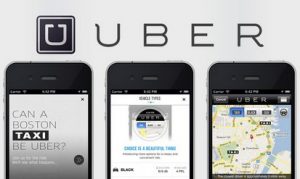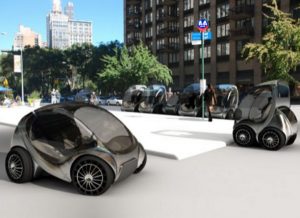 Global network competing with Uber: As other industries such as airlines have found, sometimes it’s necessary to build alliances with several international partners to create a strong global network. The ridesharing business is seeing this happen with Lyft in the U.S., Ola in India, Didi Kuaidi in China, and GrabTaxi in Southeast Asia, announcing a strategic global rideshare partnership. The joint partner ride products will start rolling out in the first quarter of 2016. For international travelers, this alliance will offer seamless ridesharing across multiple countries.
Global network competing with Uber: As other industries such as airlines have found, sometimes it’s necessary to build alliances with several international partners to create a strong global network. The ridesharing business is seeing this happen with Lyft in the U.S., Ola in India, Didi Kuaidi in China, and GrabTaxi in Southeast Asia, announcing a strategic global rideshare partnership. The joint partner ride products will start rolling out in the first quarter of 2016. For international travelers, this alliance will offer seamless ridesharing across multiple countries.- Nissan has partnered with a small San Francisco company, Scoot Networks, to test out urban mobility concept cars. There will be 10 Nissan “New Mobility Concepts” tried out with the Scoot Network Mobility Service in San Francisco. Scoot offers shared, zero-emission, smartphone-activated vehicles that one can ride, as for now only in San Francisco. The idea works similarly to a rental, but the vehicles are a much faster, easy to park way to get around town. Scoot had only offered classic electric scooters and cargo scooters. Nissan bring its all-electric, two-seater vehicle with a range of 40 miles.
- Meeting of the Minds 2015 convened Oct. 20-22, 2015 in Berkeley and Richmond, Calif. Go to this page to view videos, photos and media coverage of the event. A final report will be released in early 2016; in the meantime you can view discussion of a wide range of leading-edge urban mobility issues.
- Zipcar president Kaye Ceille thinks big changes are coming through autonomous vehicles. Like many observers, Ceille expects autonomous vehicles to make car ownership less appealing and open up bigger opportunities for Zipcar. While most carsharing and ridesharing companies are about five-years old or newer, Zipcar is a more seasoned veteran. Founded in 1999, the company has a few war stories to tell living through the original dot-com bubble and bringing an all-new transportation concept to North America and beyond.
- Those following the Hyperloop project look forward to find out who will win a competition laid out earlier this year by Elon Musk. On Jan. 15, 2015, Musk announced plans to build a Hyperloop test track and hold a contest in summer 2016 at SpaceX headquarters in Hawthorne, Calif. The goal is creating a functioning, half-scale pod. Specs for the test track’s tube were released in October. A design weekend for finalists will be held at Texas A&M University on Jan. 13, 2016.
- Self-driving car forecast: Britain’s Juniper Research forecasts that by 2025, self-driving vehicles will represent less than 1% of the vehicles in use around the world – but it’s not a small number. As many as 20 million of these vehicles likely will be operating on roads around the world by the middle of the next decade. Tesla Motors releasing its new Autopilot feature this fall has moved the technology forward faster than expected. Cadillac, Mercedes-Benz, BMW, and Nissan are among the makers planning similar autonomous features in the next few years. Nissan promises to have its first fully autonomous model in production sometime in 2020.
- Ford is joining up with several competitors in offering Apple’s Siri voice command service. But unlike some of its competitors, Ford will allow owners of vehicles dating back as far as the 2011 model-year to add the popular feature to their cars. Ford vehicle owners can go online, download the update and then plug it into vehicles equipped with Sync and Ford’s MyFord Touch infotainment system.
- Navigant Research has published two urban mobility reports. One study analyzes smart urban mobility infrastructure and services being offered in smart cities; topics covered include the market for carsharing and rideshare services; public EV charging equipment and services; smart parking systems; congestion charging schemes; and advanced intelligent transportation systems. The popular Internet of Things (IoT) concept is explored though a study on technology services for residential customers. Smart thermostats allow a user to remotely control household temperatures via a smartphone. Smart meters can connect to thermostats for demand response. According to the Navigant study, the residential IoT market is being driven by a desire to enable devices to communicate and share information for the purposes of greater efficiency, automation, security, and comfort in homes.
Tag: smart transportation
Green Auto Market adding new department on advanced transportation and urban mobility
 As I discussed last month during a workshop in Sacramento with colleagues, the “urbanization” trend with traffic congestion and air pollution is driving policy changes and increased use of transportation alternatives such as carsharing and ridesharing. Starting in this week’s Green Auto Market, a new department will join the Top 10 clean transportation stories: Advanced Transportation & Urban Mobility. Along with following companies such as Lyft, Uber, Zipcar, and Car2go, other topics that will be tracked and analyzed will include: autonomous vehicles, smart transportation, advanced vehicle technologies, Hyperloop and bullet trains, intelligent transportation systems, and connected cars. Here are some interesting advanced transportation developments over the past week………
As I discussed last month during a workshop in Sacramento with colleagues, the “urbanization” trend with traffic congestion and air pollution is driving policy changes and increased use of transportation alternatives such as carsharing and ridesharing. Starting in this week’s Green Auto Market, a new department will join the Top 10 clean transportation stories: Advanced Transportation & Urban Mobility. Along with following companies such as Lyft, Uber, Zipcar, and Car2go, other topics that will be tracked and analyzed will include: autonomous vehicles, smart transportation, advanced vehicle technologies, Hyperloop and bullet trains, intelligent transportation systems, and connected cars. Here are some interesting advanced transportation developments over the past week………
- The global electric vehicle racing event, Formula E, will be adding an autonomous electric car race next year. RoboRace will launch one-hour races designed to test artificial intelligence. These races will have 10 teams and 20 cars competing, and will take place on the same day and racing circuits as the Formula E championship. Kinetik, the company that will build all the cars for RoboRace, is “trying to make them better than humans. So it means we expect the cars will have high acceleration and high speeds,” said Denis Sverdlov of Kinetik.
- Amazon CEO Jeff Bezos is taking on SpaceX and Tesla Motors CEO Elon Musk. Blue Origin, based in Kent, Wash., and founded by Bezos, launched a rocket into space and landed it back on earth vertically on Monday of last week. While SpaceX was able to vertically land a rocket two years ago, that rocket hadn’t gone out into space. Blue Origin’s New Shepard rocket reached 329,839 feet before returning to touch down on its Van Horn, Texas concrete landing pad. That rocket can be reused and may increase the frequency of launches; Bezos would like to carry tourists as well as cargo payloads into space. SpaceX does have an edge over Blue Origin on carrying payload. Blue Origin hasn’t been used yet for carrying a payload while SpaceX’s rockets have been used for commercial, military, and NASA payload launches since 2012. SpaceX will be taking its first human transport mission to the International Space Station in late 2017.
- Uber is moving forward in navigation technology through agreements with TomTom and Microsoft. Uber will use TomTom’s maps and traffic data for its ridesharing service. Uber also acquired Microsoft’s mapping technology and the key personnel that came with it. Earlier this year, Uber also acquired veteran location industry company deCarta. Mapping data is expected to be key in Uber’s strategy to be a major player in autonomous vehicle technology.
- The number if people using carsharing services is expected to mushroom over the next five years. Berg Insight predicts that the number of people around the world using carsharing services will grow from 6.5 million this year to 26 million in 2020. The number of vehicles used in carsharing is expected to grow from 123,000 cars today to 450,000 by the end of 2020. Technologies such as telematics systems and smartphones will support this growth, along with expansion of one-way carsharing that enables users to return the car to any station operated by the carsharing firm. Carsharing growth will also come through new markets accessed by major and local carsharing services; and through car-based mobility services from car rental, carpooling, ridesharing, taxi, and ridesourcing services.
- Daimler’s carsharing service, Car2Go, is testing out a promotion to grow its membership. From now through Dec. 6, Car2Go is reducing its sign-up fee for new members from $35 to $5, and adding 60 minutes of free travel time. In addition, existing members will see the per-minute fee for signing out a car drop from 41 cents to 19 cents. Paul DeLong, the carsharing service’s CEO and president, sees the program as a way to both recruit new members and inspire existing members to use the service more regularly – and to compete with ridesharing services Uber and Lyft, which have been taking away market share. It should also help improve community relations in its home market of Austin; Car2Go had downsized its presence in the market, which received criticism from users who found their home or office suddenly cut out of the service area.
